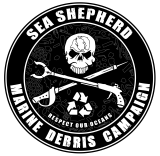News
Culturally significant Arnhem Land more polluted than ever, 10 tonnes of plastic rubbish removed by volunteers
Tuesday, 01 Nov, 2022
In October, Sea Shepherd volunteers joined Dhimurru Aboriginal Corporation rangers for a third year, to help remove plastic pollution washing up on Djulpan’s sacred shores.
Tucked away in the remote north-eastern corner of the Northern Territory, hours from any town, Djulpan beach in Arnhem Land has been suffocating under a blanket of plastic.
Over 10 days, 11 volunteers removed a shocking 10-tonnes of trash across just 4.5km of remote beach, and returning volunteers said it was the worst they had ever seen.
The Campaign
Djulpan is a culturally significant place to the Yolngu people. The beach is closed to the general public, so the debris on Djulpan is not from those living nearby, but from across the world.
Its wild and rugged terrain has been untouched by the scourge of modern materials for hundreds of thousands of years, but over the last two decades, Indigenous rangers have been faced with mountains of plastics rolling in from the Arafura Sea.
“The land can also be part of us. When we see the rubbish, it hurts us. Our culture is 70,000 years and land here has been protected by the Yolngu people looking after it… Now it has changed, we are now seeing a lot of rubbish in our sea and oceans and in the sand, and our kids will grow up and see this rubbish… it’s very sad.”
- Dhimurru Managing Director Timmy (Djawa II) Burarrwanga.
In 2018 and 2019, Sea Shepherd volunteers recognised the significance and struggles of this place, and joined forces with the Dhimurru rangers in a bid to help the beach breathe once more and return Djulpan to its pristine state.
In 2022, they were devastated to find more plastic than ever had returned.
“When volunteers first saw the beach this year, we couldn’t believe the amount of trash that had returned. We were looking at colourful sand covered in plastic for kilometres. It was the worst we have ever seen it.”
- Sea Shepherd Australia Remote Marine Debris Campaigner Grahame Lloyd
The area is home to endangered and vulnerable species, including marine turtles, which are forced to move over dense plastic and navigate abandoned fishing nets to nest.
Other animals which call the area home include dolphins, sharks, dugongs, whales, crocodiles, seabirds, echidnas, wallabies and kangaroos.
The results
Over 10 days, 11 Sea Shepherd volunteers supported by Dhimurru rangers worked to remove as much debris as they could by hand.
On average, every meter of beach was being crushed by more than two kilos of plastic.
In some parts, the sheer density of trash called for the use of shovels and rakes.
This year, 10.35 tonnes of debris was removed, an estimated 305,624 pieces, including:
- Hard plastic bits and pieces (58,086)
- Bottle tops and lids (13,626)
- Personal care items (8,793)
- Thongs (8,415)
- Icy pole wrappers (7,785)
- Plastic drink bottles (6,678)
- Engine oil bottles (6,588)
Along with plastic pieces and household items, hundreds of kilograms of lethal fishing nets were pulled from the rocks and sand. In 2019, volunteers removed all of the fishing nets from the same stretch. In 2022, more than a tonne had returned.
Volunteers spent hours clearing masses of plastic build-up from fresh turtle nests. Djulpan is a nesting ground for six turtle species, and hatchlings were facing a minefield of marine debris to make it to the ocean. Sadly, the bodies of days-old turtle hatchlings were discovered among the mounds of plastic.
"Everywhere we looked we could see turtle tracks, nesting birds or sharks and dolphins swimming. Knowing we removed more than 10 tonnes of rubbish and nets from such an important area for these animals is so rewarding. We are determined not to give up on Djulpan because if we don’t fight for this place, who will?”
- Sea Shepherd Australia Remote Marine Debris Campaigner Grahame Lloyd
A partnership for the ocean
Sea Shepherd is dedicated to protecting the world’s oceans and its inhabitants.
We were privileged to be on Yolngu land, working with the rangers to help return Djulpan to its natural state.
Through direct action in partnership with the Dhimurru rangers, Sea Shepherd volunteers are more determined than ever to help eradicate plastic debris from East Arnhem Land beaches, and educate Australians and the world about the far-reaching impacts of plastic.
While individuals can reduce their plastic consumption, producers and governments should be held responsible to come up with better end-of-life solutions for these materials and change production standards.
Together we can live up to the Dhimurru motto: Ŋillimurru bukmak djäka waŋuwu, “all of us together looking after country.” Change can be made when everyone comes to the table to discuss the future of these culturally significant places.
"This Country is our Country: our problems are your problems. Your problems are our problems. Let’s create something in this country, a better country of ours… come and help us [in] this struggle.”
- Dhimurru Managing Director Timmy (Djawa II) Burarrwanga.
Watch the video from our 2022 clean-up at Djulpan

Help us stem the tide of marine plastic pollution by joining a Sea Shepherd Australia Marine Debris Campaign clean-up near you!